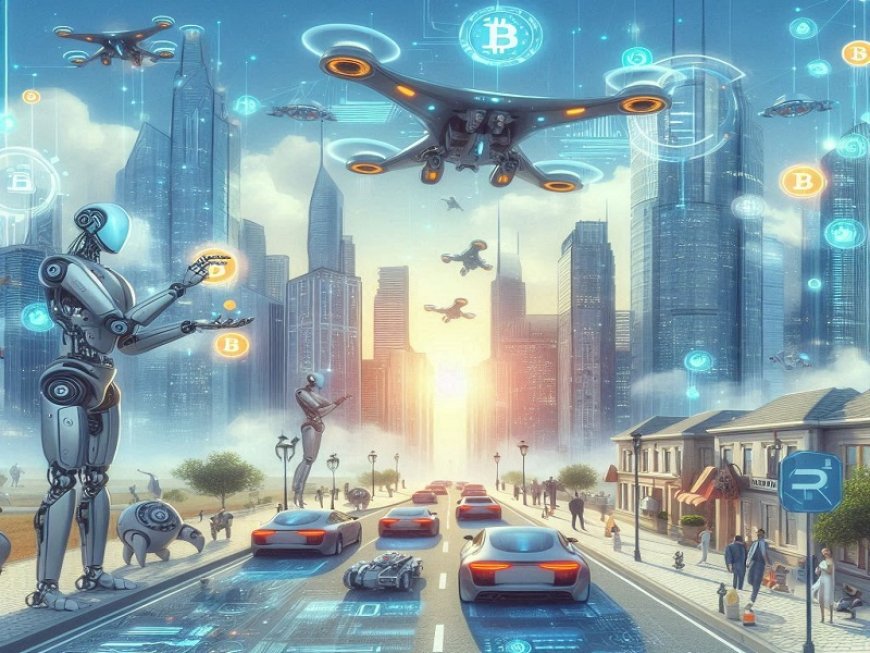How AI and Tokenization Are Shaping the Future of Transactions
Discover how AI and tokenization are transforming transactions, enhancing security, and efficiency, and lowering costs in industries like finance, real estate, and more.

In recent years, technology has drastically changed how transactions are made, recorded, and secured. Two of the most disruptive forces in this transformation are Artificial Intelligence (AI) and tokenization. These technologies are driving innovation in how businesses and individuals interact with digital assets, money, and financial systems. Together, they are shaping the future of transactions, making them faster, more secure, and more efficient.
This post explores how AI and tokenization are transforming transactions and their role in industries like finance, supply chain, and real estate. It also highlights how working with a token development company can help businesses harness these technologies.
Understanding Tokenization
Tokenization refers to the process of converting real-world assets into digital tokens on a blockchain. These tokens can represent anything—property, stocks, commodities, or even services. Tokenization leverages blockchain's transparency and security to create a digital representation of assets that can be transferred, traded, or used in smart contracts.
The process of tokenization helps reduce barriers to entry. Traditional systems for buying and selling assets often involve complex processes, fees, and intermediaries. By using tokenization, these hurdles are significantly reduced. A token development company can assist in creating these tokens, enabling businesses to tokenize their assets for easier and more efficient transactions.
The Role of AI in Enhancing Transactions
Artificial Intelligence (AI) plays an integral role in analyzing and optimizing transactions. AI algorithms can process large amounts of data in real-time, uncover trends, and make decisions faster than humans. This capability is transforming how transactions are handled across various industries.
AI’s influence on transactions can be seen in the following ways:
1. Fraud Detection and Security
Security is one of the biggest concerns in the digital world. Whether it's online payments or cryptocurrency transactions, AI helps enhance security. Machine learning algorithms can analyze transaction patterns and identify unusual or fraudulent activity. By doing so, AI helps prevent fraud and ensures that transactions are secure.
In the context of tokenization, AI can also analyze the blockchain for any vulnerabilities. This ensures that the tokens representing assets are safe from hacking or malicious attacks. Through these systems, crypto token development can be made more secure, offering businesses and individuals more confidence in their digital assets.
2. Enhanced Customer Experience
AI-powered chatbots and virtual assistants are transforming the way businesses interact with customers. When integrated into transaction systems, these AI tools can provide instant customer service, helping users with questions about payments, token usage, and other transaction-related concerns.
Through AI, businesses can also personalize experiences based on a customer’s transaction history. For instance, if a customer frequently makes purchases using a specific token, AI can recommend other assets or tokens that might interest them. This personalized experience encourages more frequent transactions and a deeper engagement with the platform.
How Tokenization and AI are Transforming Transactions
When combined, AI and tokenization offer tremendous potential to revolutionize how we conduct transactions. Here’s how these technologies are working together to create more efficient and innovative systems.
1. Speed and Efficiency
Traditionally, transactions can take several days, especially in industries like real estate, banking, and supply chain. Tokenization accelerates this process by reducing the need for intermediaries, as tokens can be traded or transferred directly between parties on the blockchain. With AI, the transaction process can be optimized further, allowing for real-time decision-making.
For example, AI can automatically validate a transaction before it happens, ensuring it meets all requirements for approval. This reduces the time spent waiting for manual validation, making transactions faster and more efficient.
2. Lower Costs
Intermediaries, such as banks, brokers, and clearinghouses, often come with high fees. Tokenization eliminates many of these intermediaries. By using a token development company to tokenize assets, businesses can reduce transaction fees significantly. AI further cuts costs by automating transaction verification, dispute resolution, and other tasks that traditionally required human intervention.
In the world of crypto, the tokenization of real-world assets is an excellent example. It allows people to trade fractions of assets that were once illiquid or difficult to access. With crypto token development, individuals can buy and sell tokenized shares of real estate or artwork, for example, opening up new markets and reducing the cost of these transactions.
3. Decentralization and Transparency
Blockchain’s decentralized nature ensures that all transactions are recorded on an immutable ledger. This transparency allows businesses and individuals to verify the authenticity of any transaction without relying on a central authority. AI can complement this by analyzing blockchain data to spot trends or irregularities, enhancing transparency even further.
For businesses, this provides a level of trust that was previously unavailable in traditional transaction systems. Companies in industries like supply chain, healthcare, and finance are already adopting tokenization and AI for greater transparency. With tokenized assets, stakeholders can track the movement and ownership of goods or services across the entire supply chain.
The Benefits of AI and Tokenization in Different Industries
AI and tokenization are not just transforming how individuals make transactions; they are also having a huge impact on various industries. Let’s look at some key sectors that are benefiting from these technologies.
1. Finance and Banking
The financial industry is perhaps the most directly impacted by both AI and tokenization. AI-powered tools in banking can analyze customer data and transaction patterns to offer personalized services, optimize risk management, and enhance fraud detection.
Tokenization allows for faster, more secure digital transactions. By tokenizing assets, banks and financial institutions can offer fractional ownership in assets like real estate, reducing investment barriers. Additionally, crypto token development is allowing financial services to offer new products and services, such as blockchain-based loans or digital securities.
2. Real Estate
Real estate is a sector that stands to benefit greatly from tokenization. Traditionally, buying and selling property is a lengthy process with significant fees. Tokenization allows real estate assets to be fractionalized, making it easier for investors to buy and sell shares of properties. AI can optimize the process by analyzing market trends and suggesting optimal times for transactions or investments.
3. Supply Chain and Logistics
Tokenization helps to streamline the supply chain by providing real-time tracking of goods. AI can analyze data from the entire supply chain to optimize operations, predict delays, and ensure that products are delivered on time. By using tokenized assets to represent goods or shipments, businesses can better track and verify transactions.
AI and Tokenization in the Future of Transactions
As these technologies continue to develop, we can expect further innovations in how transactions are conducted. Crypto token development will play an important role in this evolution. The tokenization of everything from real estate to commodities will create more liquidity and open up new markets for businesses and consumers alike.
In the future, we might see a shift toward fully automated transaction systems. AI will continue to improve, helping to reduce human error and optimize decision-making in real time. Tokenization will make it easier to own, transfer, and trade assets digitally, eliminating the barriers that traditional finance and trading systems impose.
Conclusion
AI and tokenization are not just buzzwords; they are shaping the future of transactions in significant ways. By removing intermediaries, reducing costs, increasing security, and enhancing transparency, these technologies are providing new opportunities for businesses and consumers alike. Whether it’s through crypto token development or leveraging AI for better decision-making, the combination of these two forces will continue to transform the way we handle transactions.
For businesses looking to stay ahead, partnering with a token development company to explore tokenization and AI-driven solutions will be essential for remaining competitive in the rapidly changing digital landscape. Together, AI and tokenization will play a pivotal role in defining the future of financial transactions and beyond.
What's Your Reaction?


















